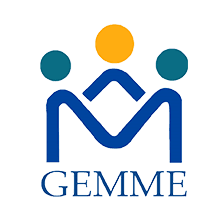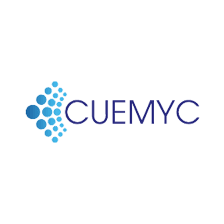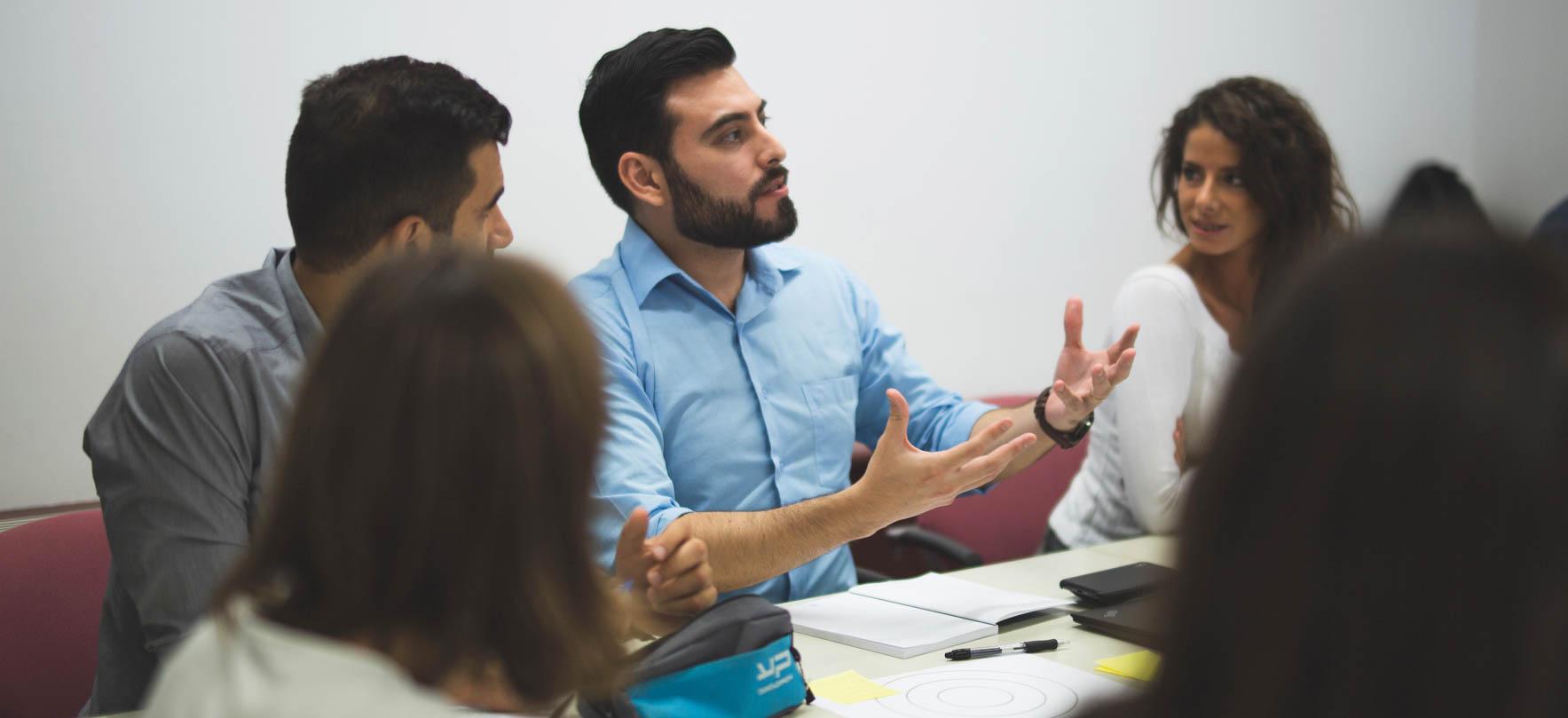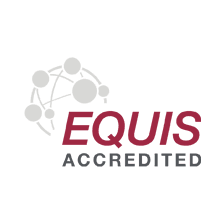The mediator is an increasingly in-demand profile for conflict resolution and intercultural, civil, and commercial mediation. The Master in Professional Mediation, a program for international students, trains you in conflict management to act as a mediator both in business contexts and in civil, commercial, and criminal conflicts.
With the Master in Professional Mediation you will be trained in professional mediation and conflict management in business contexts as well as in civil, commercial and criminal conflicts. At the end of the Master, you will obtain the recognition required by the Generalitat de Catalunya and the Spanish Ministry of Justice to be registered in the official mediators registers.
In the lifelong learning Master in Professional Mediation you will learn how to apply the main theories of professional mediation, such as: Harvard's 7 elements, the empowerment of the Transformative model, the alternative history of the Circular Narrative school, etc. These will help you create your intervention model in labour, social contexts, financial transactions, insurance, family, or in disagreements between partners.
In the master, you will also be trained in Work Place Mediation, in order to introduce techniques of mediation culture in companies and organisations, and thus, effectively manage conflict resolution in work teams and promote prevention and occupational health. In civil and criminal mediation you will also study how to deal with family conflicts, disputes between neighbours and misunderstandings between people from equidistance and confidentiality.
The master's degree will also introduce you to concepts of civil and commercial law, the psychology of interpersonal and group conflicts, elements of the psychosociology of groups and branding, marketing, and management techniques necessary for good professional mediation.
The Master in Professional Mediation is endorsed by the Pompeu Fabra University, the first Spanish university and the 15th best university in the world (of those with less than 50 years of history), according to the Times Higher Education ranking. In turn, the UPF Barcelona School of Management has the EQUIS accreditation, the most prestigious institutional recognition for business schools worldwide.
Collaborators:

Why choose this program
Professional Guidance in Every Session
Benefit from the personalized guidance of an expert coach in our mediation sessions, allowing you to master advanced techniques and receive practical advice, preparing you to excel in the field of mediation.
Learn from the Experts
Engage in real practices alongside program directors, where you will apply your knowledge in real mediation situations and gain a deep understanding of the mediation world, preparing you for a successful career.
Continuous Post-Master's Guidance
During the first year, you will receive follow-up and supervision to help you solidify your 'power skills' during your integration into the workforce. This personalized support ensures that you effectively apply the acquired competencies, strengthening your negotiation, communication, and leadership skills in real situations.
Direct Connection to Job Opportunities
During your internship period, you will have exclusive access to active job offers in the mediation field. This practical integration is key to our commitment to facilitating your professional success, with 80% of our graduates successfully entering the job market in the year following the completion of their studies.
Lifelong Learning
We believe it's crucial, after the training, to support you in your professional integration into the field of mediation and other ADRs. During the second year, and optionally, you'll have supervision from the management in your mediations, co-mediation with them, and tutoring to assist you in your initial mediation actions; as well as support and guidance in launching your innovative personal project.
Who is it for?
The Master in Professional Mediation is aimed at those people who want to be professional experts in dialogue resolution of conflicts and professional mediators. The master's is especially aimed at professionals in the field of law, social and legal sciences, psychology, social work, sociology, education, or economics and other graduates who want to find an innovative, enriching and complementary professional career path to their own.
Accreditations
Our master's program is accredited by the Department of Justice, which allows you to be part of the Generalitat de Catalunya's register of mediators, receive public judicial cases, and work in any of the public administrations of Catalonia.
The UPF Barcelona School of Management is the management school of the Universitat Pompeu Fabra (UPF), the 3rd best public university in Spain according to the Times Higher Education ranking. It is the best Spanish university, 10th in Europe, and in the Top 20 worldwide in its 2023 ranking of the best young universities.
UPF Barcelona School of Management has EQUIS accreditation, the most prestigious institutional recognition for business schools globally, and places itself among the top business schools in the world.
Curriculum
The study plan for the Master in Professional Mediation is structured into 5 subjects and a Master's Final Project that is developed throughout the course.
In each of the subjects, practical cases will be seen and monitored training will be carried out in professional mediation and conflict resolution. This is personalized training that has teachers and coaches in the classroom who support you in the development of a new professional role.
- The seven Harvard Elements
- The Stages of the Process:
- Opening of a mediation process
- From positions to interests
- Establishment of a work schedule
- The work of the objective criteria of the conflict
- Analysis of the alternatives
- Generation of options
- Agreements and monitoring
- Contributions of Law, Psychology, social work, Anthropology, Sociology, and Pedagogy to Harvard mediation
Restorative Justice
Techniques and strategies in criminal mediation
Techniques and strategies in community mediation
Techniques and strategies in family mediation
Legitimation, deconstruction of the conflict, work with differences, subjective position, co-construction of the relationship.
Narratives in mediation, externalization and reciprocation conversations, miracle questions, positive connotation, etc.
- Mediation in the field of private law: Civil: Family, Community, Conflict between Individuals
- The Environment, the professionals, the typology of the conflicts, and the people
- The process, strategies, and techniques of this area of specialization
- Mediation on horizontal property issues, in the neighbourhood, in the city
- Mediation on issues of divorce, family problems, inheritance, foster care, filiation, family business, etc.
- Multiparty techniques in public conflicts
- Necessary contributions from other disciplines
- The mediating role in this area of specialization
- Training in simulated cases. Co-mediation with course teachers
- Conflicts within organizations: Work Place Mediation
- Conflicts between organizations. The value of money in mediation
- Team management tools. Improve results and increase business volume
- Mediations with lawyers and parties in distributive disputes
- The process, strategies, and techniques of mediation in monetary matters
- Mediation in conflicts within and between organizations, in commercial matters, insurance, between partners, rentals, mortgage arrears, etc.
- Necessary contributions from other disciplines
- The role and profile of the mediator in this area of specialization
- Training in simulated cases. Co-mediation with course teachers
- The relationship between companies: communication, negotiation, and emotions
- Mediation as a process and change for conflict resolution
- Conflicts between formal and informal organizational charts
- Work team management techniques: Open Space, Dialogue Circles, Lego Serious Play, Focus Group, single text.
- Elements of theory and group dynamics for analysing problems
- Example of cases in organizations (health, business, school, third sector, formal and informal, etc.)
- Systemic principles of interpersonal communication
- Gestalt technical tools for analysing poor communication, counselling, coaching, mind maps, and mediation in the company
- The mediation process: contributions of the Harvard model, the transformative model and the Circular Narrative Model
- The legitimation of the discourse of the parties
- Types of questions to restructure the discourse of those involved, externalizing conversations, the construction of alternative story, the miracle question.
- Peter Fonagy's concept of mentalization.
- Contributions of Folger and Bush (recognition, bonding, appreciation, and empowerment)
- Mirror techniques to promote recognition
- Communication techniques of the mediator (discourse, active listening, rethinking, paraphrasing, presuppositional questions, Agent of reality)
- The culture of mediation as an agent of transformation of organizational and corporate culture
- Mediation in pecuniary disputes, techniques to evaluate, and prepare the parties. The Z.O.P.A.
- Work with the parties' attorneys in mediation
- Pre-mediation techniques: prior communications, documentation analysis, agreement prior to the intervention
- From collaborative mediation to evaluative mediation
- Techniques to overcome deadlocks in negotiations and mediations
- Psychological principles for a mediator. Influence techniques to unlock a negotiation: reciprocity, consistency, similarity, authority, scarcity, reactive devaluation, sense of justice, attribution errors, “false consensus bias”
- The difficulties of mediation by haggling and skills to overcome them
- Evaluation techniques: Robert Simmons evaluation formula, decision trees, risk analysis, diagramming the problem
- Med-Arb. The participating mediator, the mediator's proposals, techniques to propose exit scenarios from the problem situation
The Master's Dissertation (TFM) can be done in groups (maximum of three students) and requires applying the theoretical and practical knowledge acquired throughout the program. The TFM is carried out under the supervision of a tutor and the mentoring of the program directors.
This work may have a practical aspect (designing an innovative project to implement or complement mediation in society) or a theoretical aspect (analysing and reflecting the various aspects that ADR and mediation provide to citizens who want to access justice systems and promote coexistence policies), in both cases, it ends with a public presentation before a panel composed of a professor of the BSM-UPF, a member of GEMME (European Group of Magistrates for Mediation) and a mediation professional.
Note on the Curriculum
Complementary activities
The Master in Professional Mediation also includes the possibility of participating in practical activities and activities for personal and professional growth such as:
- UPF-BSM Inside: is a group of interdisciplinary subjects (applied data, communication, creativity, innovation and project management, sustainability and leadership among others) that, if you take this program, you can access at no additional cost. They are 100% online and you can take them throughout the academic year at your own pace, as they have been designed as self-study subjects.
Qualification obtained
Once you have passed the program, you will receive the following electronic degree certification (eTítulo©): Lifelong learning master's degree in Professional Mediation , awarded by Pompeu Fabra University. The eTítulo© will be issued in Catalan, Spanish and English.
The electronic degree certification (eTítulo© ) is an authentic digital degree, issued in pdf format and electronically signed, with the same legal validity as if it were in paper format.
Faculty
All the teachers on the master are active professional mediators.
Academic directors
Faculty
Collaborating faculty
- Raquel Alastruey
Magistrate at the Barcelona Court.
She was also a lecturer at the Judicial College from 2002 to 2004 and advisor for the Department of Justice of the Generalitat de Catalunya (Catalan Government) for the implementation of the Judicial Office in 2006. - Miguel Bonet
Professional lawyer and mediator. - Isabel Cabós
- Andreu Calvet Cortés
Lawyer, mediator in centres for Mediation and Coexistence, S.L.
Associate mediator for Wilhelm-Munné & Asociados.
Mediator for the Sant Pere de Ribes Town Hall. - Joan Cambronero
- Enrico Cirla Bracchi
Psychologist and mediator for the Centre for Mediation and Coexistence in the Sant Pere de Ribes Town Council. - Carme Guil
Magistrate of the Provincial Court of Barcelona.
Professional mediator (UPF).
Vice Preside. - Marcos Hernando
He also has a degree in Political Science and Administration.
Human Resources Deputy Director at Mar Health Park Consortium (Barcelona).
Deputy Director of the Department of Human Resources at the Barcelona MAR Health Park. - Dina Jansenson
Experienced Mediator and Arbitrator, mediation, negotiation and conflict resolution coach.
She is also ombudsman for one of the largest media companies in the world. - Adrià Jofre Bosch
Economist, Negotiator, and Professional Mediator, Master in Sciences, Negotiation, and Conflict Resolution from Columbia University. - Rafael Llinás
Clinical psychologist and professional mediator.
Director of the mediation area of the Sant Adrià del Besós Town Hall. - Miriam Markus
Degree in Education Sciences, mediator, and psychodramatist.
Evaluator of mediators for the Ministry of Justice of Argentina. - Mariàngels Negre
Architect and mediator. Expert in mediation in administrative litigation. - Anna Pérez Soto
Mediator at the Centre for Mediation and Social Harmony at Castelldefels Town Council.
She is also a judicial mediator and lawyer. - Milena Prokajlevic Bugarski
Researcher on the White Paper on Mediation in Catalonia project.
Associate Mediator at Wilhelm-Munné & Asociados.
She is a mediator for the Barcelona City Council. - Charo Soler
Psychologist and mediator.
Coordinator of the mediation and technical advice service of the Generalitat de Catalunya. - Ana Uzqueda
Vice-President and Director of Education at the Association Equilibrio & R.C.
Bachelor in Law from the University of Buenos Aires (Argentina).
She is also Mediation Coordinator at the University of Siena, University of Sassari, the University of Sassari and the Polo Universitario Grossetano. - Antoni Vidal Teixidó
Founding partner of Alter-Serveis Integrals de Mediació.
Diploma in Mediation from the Barcelona Bar Association (Ilustre Colegio de Abogados de Barcelona). - Arantxa Vilar López
Mediator, lawyer, and art therapist.
Mediator for the Castelldefels Town Hall. - Carlos Villagrasa Alcaide
Judge at the Provincial High Court of Barcelona.
PhD in Law from the University of Barcelona.
Tenured lecturer of Civil Law at the University of Barcelona.
Methodology
The teaching and learning methodology in professional mediation is through theoretical and technical explanations, and mediation simulations to know how to apply the various methodologies and skills in the classroom, with actors and among the students. The objective of the master is to understand the consequences and the usefulness of the techniques to be acquired, from different roles that act in mediation and conflict management processes.
The master teaches 3 models of mediation: Harvard, transformative and narrative, as well as the relational method in mediation.
Support and development of Initiatives
In our Master's program, supported by the program's leadership, we provide you with the necessary tools to open new doors in the world of mediation. Our practical approach includes monitoring initiatives and implementing innovative projects and services, ensuring that our students are at the forefront of professional mediation.
Advanced Techniques for Team Leadership
We focus on developing key skills for effectively managing and leading teams. Through the teaching of advanced techniques, we foster skills such as organization, critical thinking, creativity, and adaptability. Our methodology integrates principles of Agility, preparing you to successfully confront and resolve interpersonal and professional challenges.
Improvement of workplace environment and collaborative performance
We provide essential tools to improve the work environment within teams. Our goal is to increase effectiveness and collaborative performance, emphasizing the importance of a positive and productive work environment.
Optimization of work in Rigid Organizations
Our program will equip you with strategies to improve efficiency in rigid and multidisciplinary organizations. We will teach you to analyze complex situations and implement effective operational solutions, promoting a cross-functional work approach.
Overcoming stagnation due to Human Factors
We understand that human challenges, such as fears, competitiveness, and insecurities, can cause stagnation in work teams. We provide practical tools to overcome these obstacles, improving team dynamics and fostering a more harmonious and productive work environment.
Evaluation
The Master in Professional Mediation uses continuous evaluation and a final evaluation to award the accrediting title in professional mediation.
On the one hand, participation and growth in the acquisition of mediating techniques, skills, and competences are evaluated. The student is supported and mentored, in the development of a new professional role by professional mediation coaches, receiving feedback.
Each student will have two confidential meetings with the Directors of the Master to evaluate their development, progress and use of the training for a new professional role.
On the other hand, at the end of each subject, a self-evaluation of the knowledge acquired through self-evaluating exams must be carried out and in which the directors of the master make indications to improve and/or clarify concepts.
Tools
The On-Campus&Live methodology allows you to follow the program in person and also remotely.
In this modality, two stable subgroups are opened that will coexist throughout the course: one face-to-face and the other with 100% remote students. The remote students (a maximum of 15 places per course) will follow the program in a synchronous way with the face-to-face students. That is, they will share the same school calendar and schedule as the face-to-face students.
Project-oriented learning and the combination of lectures and active methodologies such as case studies, flipped learning, solving real problems, and professional simulations allow the student to connect theory and practice, acquire advanced skills, and achieve learning which is transferable to the job. The face-to-face modality is enriched with elements of online programs (virtual learning environment, multimedia resources, among others) so that the learning experience of the two subgroups is equally satisfactory.
You will have:
- Master's or postgraduate work to learn by doing
- A personal mentor to monitor your Master's Final Project (TFM) or Postgraduate Final Project (TFP)
- Digital resources to achieve transversal skills
- Interdisciplinary activities and workshops
- Digital resources and audiovisual blocks for online learning
- Active methodologies for transferable learning
Professional Future
On the Master in Professional Mediation, you will share a classroom with national and international students and you will learn to be and to act as a professional mediator in conflicts that occur in organizations, companies, the family, or the community, among other fields of action. You will also acquire conflict management skills and techniques and create intervention programs in dialogue management of disputes.

Student profile
The Master in Professional Mediation brings together students from all over the world with a very heterogeneous profile in which graduates in Law and Criminology stand out. However, students from other disciplines such as architecture, business administration, economics, philology, engineering, social education, etc. also share the classroom.
Average age
Average number of years of professional experience
Graduates in Law
Graduates in Criminology and Public Prevention Policies
Career opportunities
Training in mediation and other alternative forms of conflict management and resolution gives you the tools and techniques necessary to analyse interpersonal conflict situations, plan and design methodologies, intervene to prevent and improve, or resolve the situation. In the master we prepare you to mediate in disputes between couples, intra-family, corporate, in work teams, community, organizational, with companies or in consumer issues. You will learn strategies and techniques for negotiation and conflict management when you have to represent an entity or have to manage your own problem, and you will understand the dynamics of a group or organizations to think about when and how to intervene.
The Master in Professional Mediation includes the possibility of extracurricular internships. They are not part of the academic content of the master's or postgraduate courses. They are considered a complement to the class sessions.
- They are not mandatory. If you want to do them, you must state it at the time of admission.
- Includes the agreement management and advisory service
- The Professional Careers Service maintains active contact with companies, promotes your application and manages the internship agreement. Remember that the ultimate managers of the selection process are the companies and organizations themselves.
Career opportunities:
- Judicial mediator
- Pre-judicial mediator
- Private mediator or hired by companies
- Professional negotiator
- Conflict situation analyst
- Conflictologist
- Promotion of occupational health in HR
Grants, scholarships and financing
Scholarships
The UPF Barcelona School of Management offers you different means of financing so that you can take any of our programs without worry. We offer you the opportunity to finance part of your program, either by rewarding your talent through scholarships, through grants from entities dedicated to promoting education or through collaboration agreements with financial entities.
Grants and discounts
UPF Partner Latinoamerican Universities Discount
If you are alumni of one of our Partner Universities, you are entitled to a discount of 10% on the UPF Barcelona School of Management Masters and postgraduate program tuition fees (those programs with more than 15 credits).
*Discount not compatible with other scholarships, discounts and reductions.






